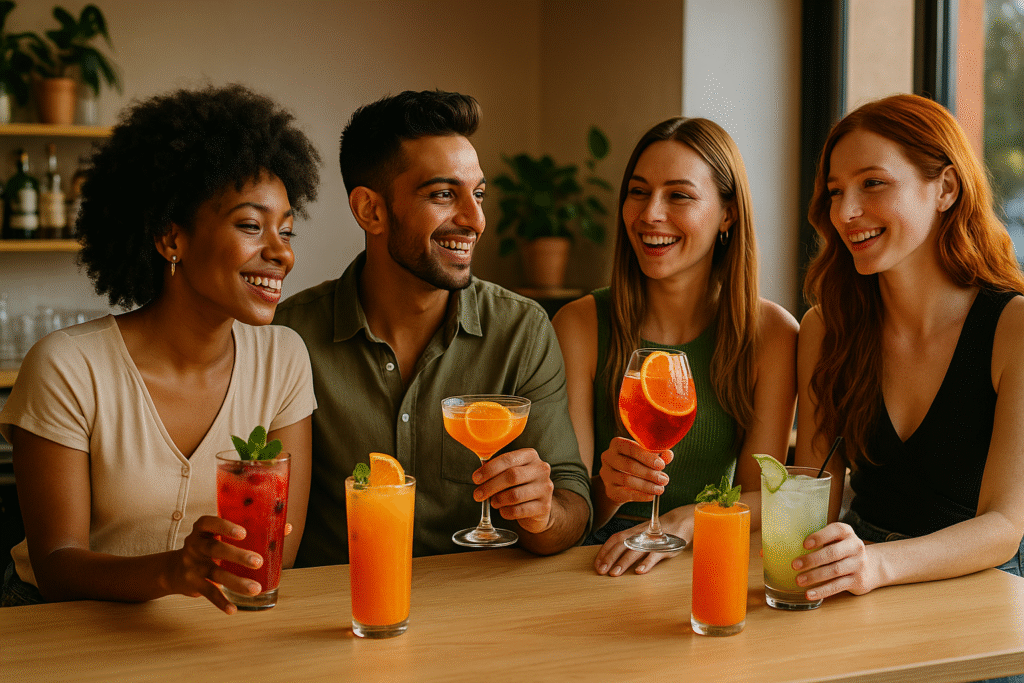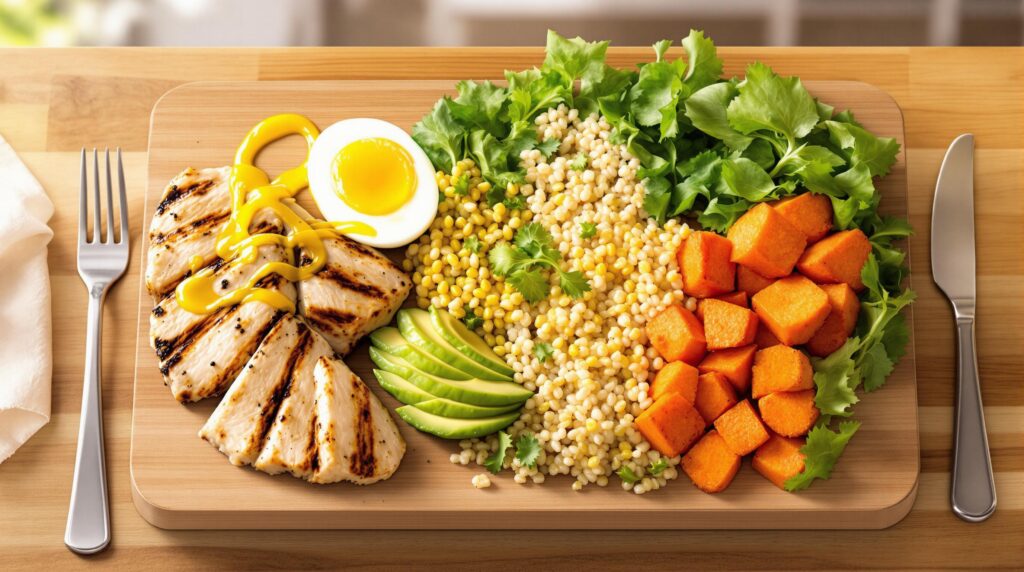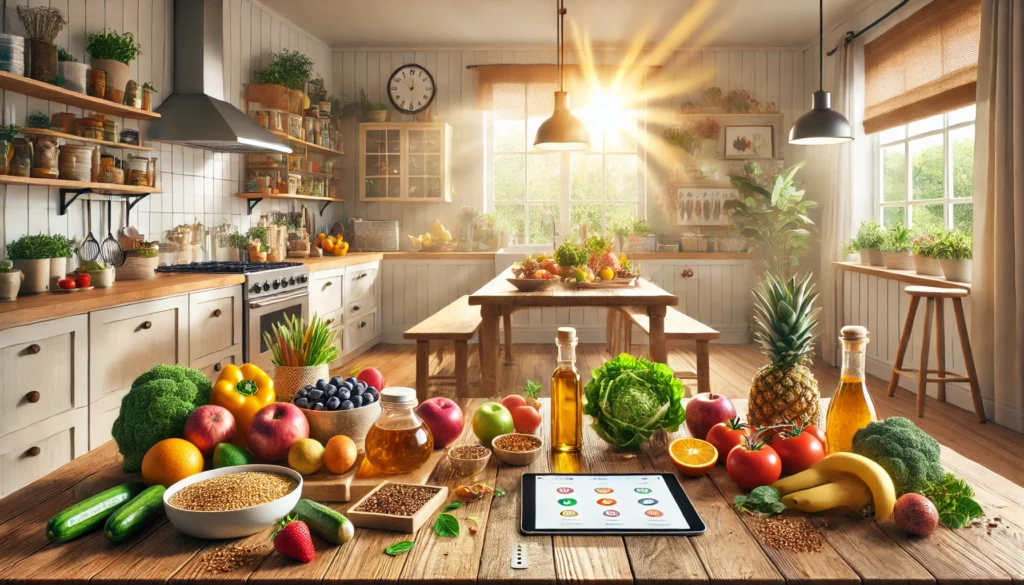In a country where happy hours, celebratory toasts, and weekend wine downs have long been tied to alcohol, a quiet but powerful revolution is brewing. Americans are increasingly reaching for drinks that sparkle, fizz, and delight—without the buzz. Non-alcoholic cocktails, also known as mocktails, are no longer just sugary afterthoughts on a bar menu; they’ve become sophisticated, health-conscious beverages making waves across the wellness and nightlife scenes.
The rise of non-alcoholic cocktails in the United States speaks volumes about shifting attitudes toward health, mindfulness, and social connection. Whether it’s Gen Z opting out of alcohol altogether, or health-savvy millennials choosing moderation, the demand for alcohol-free alternatives has never been stronger. In this article, we’ll explore the drivers behind this movement, the best ingredients and techniques for making mocktails at home, and how this trend is reshaping everything from bar culture to mental wellness. Get ready to rethink your drink.
The Rise of the Sober-Curious Movement
A Cultural Shift Toward Mindful Drinking
The “sober-curious” movement encourages individuals to question their relationship with alcohol. Rather than focusing solely on sobriety as a necessity (as in recovery communities), the movement promotes mindful drinking—choosing when and why to drink, and exploring alcohol-free alternatives. As wellness culture expands, many Americans are finding that going booze-free helps them sleep better, stay mentally sharp, and maintain healthier routines.
Gen Z and Millennials Lead the Charge
Younger generations are leading the way. According to a NielsenIQ survey, 66% of millennials say they’re trying to reduce their alcohol intake. Gen Z consumers are even more deliberate, embracing a lifestyle that prioritizes mental clarity, fitness, and authenticity. For these groups, mocktails offer the ritual of drinking without the regrets that often follow.
Health Benefits Fuel the Trend
There’s growing awareness that even moderate drinking can negatively affect brain health, liver function, and hormone balance. Non-alcoholic cocktails, by contrast, often include fresh juices, herbs, adaptogens, and hydrating ingredients. This makes them a win-win: socially satisfying and body-friendly.
Dry January Goes Mainstream
Once seen as a niche health challenge, Dry January has become a national trend. Participation rates have surged year-over-year, with more than one-third of U.S. adults attempting a dry month in 2024. This seasonal pause often leads to lasting behavior changes—and drives demand for better alcohol-free options.
The Industry Responds
Beverage companies have taken note. From Heineken 0.0 to sophisticated non-alcoholic spirits like Seedlip and Ritual, brands are crafting nuanced, adult-tasting drinks for the modern palate. Craft cocktail bars are also elevating their mocktail game, offering booze-free menus with the same attention to detail and complexity as traditional drinks.
How to Make Show-Stopping Mocktails at Home
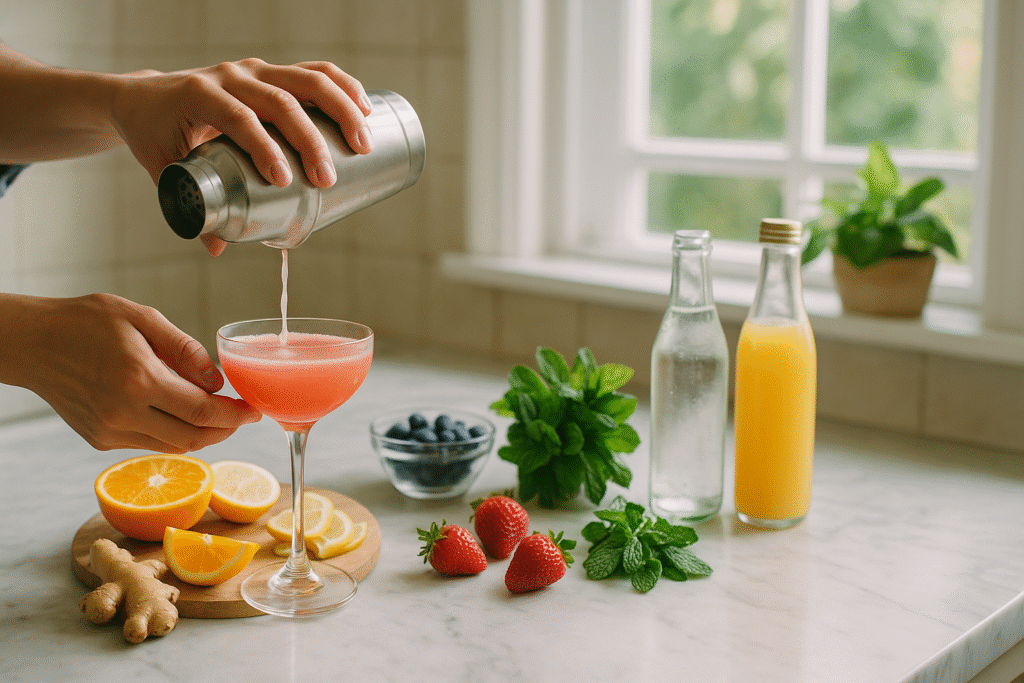
Essential Tools for Crafting Mocktails
Before diving into recipes, it’s important to equip your kitchen with the right tools. Like traditional cocktails, mocktails benefit from proper technique and presentation. Essentials include:
- Cocktail shaker – for mixing and chilling ingredients evenly
- Muddler – to extract flavors from herbs, fruits, or spices
- Jigger – for precise measuring
- Fine mesh strainer – to remove pulp or herb particles
- Highball and coupe glasses – for elegant serving
Choosing High-Quality Ingredients
The secret to a delicious mocktail lies in freshness and balance. Aim to include:
- Acid – lemon, lime, vinegar, or kombucha
- Sweetness – honey, agave, maple syrup, or fruit juices
- Bitterness – non-alcoholic bitters or citrus peel
- Herbal or floral notes – mint, basil, lavender, rosemary
- Effervescence – soda water, tonic, or sparkling juice
These elements create a drink that excites the palate in every sip.
Three Simple Mocktail Recipes to Try Tonight
Ginger Citrus Fizz
Ingredients:
- 1 oz fresh lemon juice
- ½ oz agave syrup
- 2 oz ginger beer
- Sparkling water to top
- Mint leaves for garnish
Shake lemon juice and agave with ice, strain into a highball glass, and top with ginger beer and sparkling water. Garnish with mint.
Cucumber Basil Cooler
Ingredients:
- 3 slices cucumber
- 3 basil leaves
- ½ oz lime juice
- 1 oz apple juice
- Club soda to top
Muddle cucumber and basil, add juice, shake with ice, strain, and serve over fresh ice with a cucumber slice on top.
Berry Hibiscus Mocktail
Ingredients:
- 1 oz hibiscus tea (cold brewed)
- 1 oz cranberry juice
- ½ oz honey
- Soda water to top
Mix tea, juice, and honey in a shaker with ice. Strain into a chilled glass and top with soda water.
Health Benefits of Non-Alcoholic Cocktails
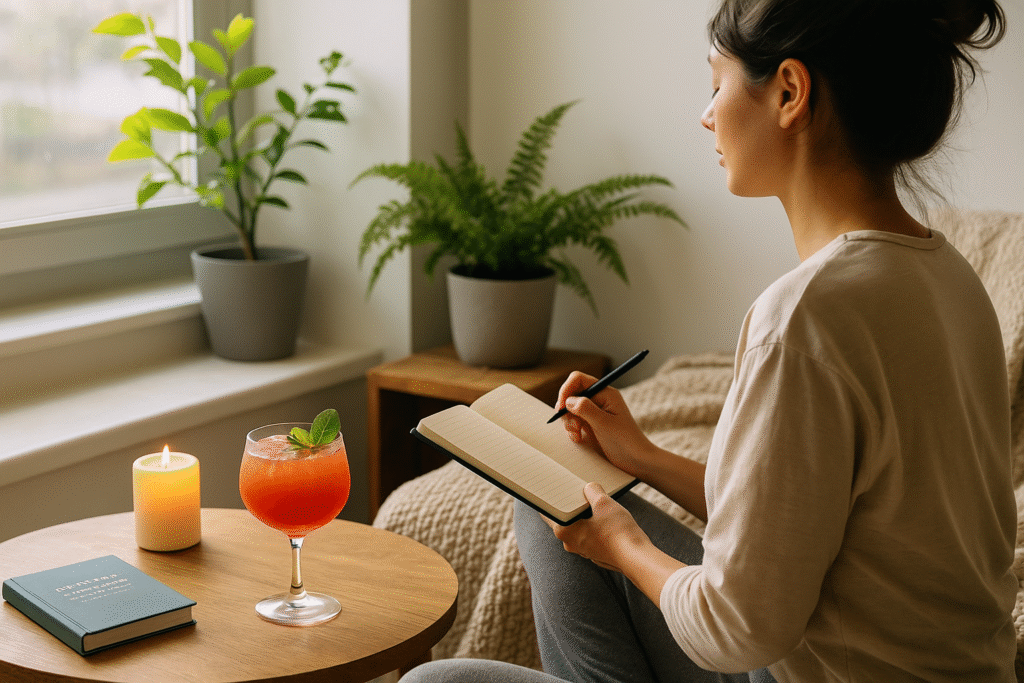
Supporting Liver and Brain Health
One of the clearest benefits of cutting out alcohol is giving your liver a break. The liver processes alcohol as a toxin, and regular drinking—even in moderate amounts—can cause inflammation and impair its ability to regulate fat, sugar, and hormone levels. Studies from the NIH show that alcohol is also neurotoxic in the long term, potentially affecting memory, decision-making, and emotional regulation.
Non-alcoholic cocktails allow you to enjoy complex, satisfying beverages without putting your liver or brain at risk. Many contain ingredients like turmeric, beet juice, or milk thistle—known for their liver-supportive properties.
Improved Sleep and Mood Stability
Alcohol can initially make you sleepy but later disrupt your sleep cycle, especially REM sleep, which is essential for mental restoration. In contrast, many mocktails are made with ingredients like chamomile, lavender, or magnesium-rich herbs, which support relaxation without grogginess the next day.
Fewer Calories, Less Sugar (When Done Right)
While sugary sodas and juices can sneak into some mocktails, high-quality alcohol-free cocktails tend to be lighter. When made with natural sweeteners and portioned properly, they are lower in calories than traditional cocktails or wine.
For instance:
- A margarita contains 200–300 calories and 30+ grams of sugar
- A homemade lime-mint mocktail can be made with under 80 calories and <10g sugar
This makes mocktails a great choice for those pursuing weight loss or metabolic balance.
Mental Clarity and Emotional Wellness
Eliminating alcohol has profound effects on mental health. Many people report increased clarity, sharper focus, and improved emotional regulation within days of abstaining. Mocktails offer a psychological substitute—helping with the ritual and sensory pleasure of a drink without the fog that follows alcohol.
✅ Expert Summary
Reducing or eliminating alcohol intake has wide-ranging benefits: improved liver function, better sleep, fewer empty calories, and enhanced mood. Non-alcoholic cocktails offer a flavorful path to health without sacrifice.
How the Beverage Industry Is Innovating for the Sober-Curious Market
From Big Brands to Boutique Distilleries
The surge in interest around non-alcoholic cocktails has catalyzed rapid innovation across the beverage industry. Legacy brands like Heineken, Budweiser, and Corona have rolled out alcohol-free versions of their flagship products. But it’s the smaller, artisanal players who are pushing boundaries.
Startups like Kin Euphorics, Ghia, and Monday Gin are crafting botanical spirits that mimic the complexity of alcohol using adaptogens, nootropics, and herbal extracts. These drinks aim to deliver more than just taste—they promote calm, focus, or energy through functional ingredients.
Growth of the Functional Beverage Market
The functional beverage sector—drinks designed to support health and wellness—is projected to surpass $200 billion globally by 2027. Non-alcoholic cocktails are a major part of this boom. Key innovations include:
- Adaptogenic elixirs – using ashwagandha, reishi, or rhodiola to reduce stress
- Mood-boosting mixers – including 5-HTP or magnesium
- Energy-enhancing tonics – with green tea extract or B12
These offerings not only satisfy the sober audience but also appeal to fitness enthusiasts, biohackers, and wellness seekers.
Retail and E-Commerce Explosion
What started as niche products in health food stores has gone mainstream. Today, you’ll find entire non-alcoholic sections at Whole Foods, Target, and Total Wine & More. E-commerce platforms like Boisson, Better Rhodes, and Sipple specialize exclusively in alcohol-free options, offering nationwide delivery and curated kits.
These retailers often provide tasting notes, pairing guides, and social event bundles—emphasizing the lifestyle value of going alcohol-free.
Hospitality and Events Join In
Bars, restaurants, and event planners have also adapted. Michelin-starred restaurants now offer alcohol-free pairing menus. Major music festivals like Coachella and South by Southwest have included zero-proof cocktail lounges. In cities like New York and Los Angeles, you’ll find sober speakeasies and mocktail-only bars thriving.
This shows that abstaining from alcohol no longer equates to opting out of nightlife or celebration—it simply means drinking differently.
What the Research Says About Alcohol-Free Living
Cognitive Benefits and Neuroprotection
Multiple studies confirm that alcohol impairs neurogenesis and accelerates cognitive decline. A 2022 study published in Nature Communications found that even light-to-moderate drinking (1–2 drinks per day) was associated with reduced brain volume. By contrast, those who abstained had stronger memory performance and executive functioning.
Choosing non-alcoholic options protects brain health and can enhance long-term mental clarity, especially in middle age and beyond.
Cardiovascular Health Improvements
While moderate wine consumption was once thought heart-protective, recent findings have challenged that narrative. A comprehensive review by the World Heart Federation found no level of alcohol consumption that improves heart health. Reducing alcohol can lead to:
- Lower blood pressure
- Improved cholesterol balance
- Reduced risk of atrial fibrillation and stroke
Mocktails made with ingredients like hibiscus tea, pomegranate juice, or beetroot offer cardiovascular benefits without the alcohol-associated risks.
Impact on Mental Health
A 2021 study in The Lancet Psychiatry revealed that reducing alcohol intake—even without total abstinence—correlates with lower levels of depression and anxiety. Alcohol is a known depressant and disrupts serotonin and dopamine regulation, leading to emotional instability.
By replacing alcohol with herbal, adaptogenic, or nutrient-rich mocktails, many individuals experience mood stabilization within just a few weeks.
Quality of Life and Social Behavior
Going sober—or simply drinking less—often leads to better decision-making, more consistent energy levels, and improved relationships. According to Alcohol Change UK, 72% of Dry January participants report better sleep, and 63% notice improved skin health.
These measurable quality-of-life benefits are motivating more people to reduce or eliminate alcohol, permanently.
Creating a Sober-Positive Lifestyle That Lasts
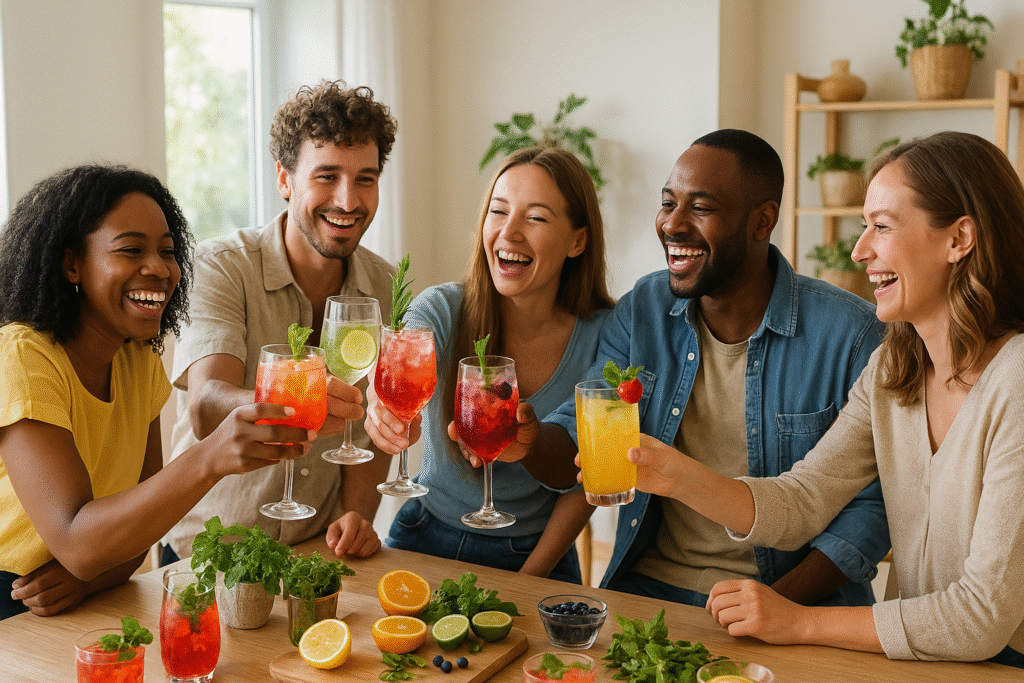
Redefining Celebration Without Alcohol
One of the most powerful shifts in a sober-positive lifestyle is the ability to celebrate without compromise. Birthdays, weddings, promotions—these moments are just as joyful (if not more) when fully present and clear-headed. Curating events with non-alcoholic options shows intentionality and inclusiveness.
You can stock a home bar with:
- Alcohol-free spirits like Seedlip or Lyre’s
- Herbal syrups (lavender, elderflower, ginger)
- Fresh juices, infused waters, and sparkling teas
- Mocktail recipe cards for guests to mix their own
Building a Supportive Environment
A key to sustaining change is environment. This includes:
- Surrounding yourself with others exploring sobriety
- Following influencers or authors like Ruby Warrington (Sober Curious) or Holly Whitaker (Quit Like a Woman)
- Engaging in sober-friendly events, yoga retreats, or cooking workshops
These circles reinforce your decision and normalize the alcohol-free lifestyle.
Developing New Rituals
Much of drinking is tied to habit—not desire. Replacing these rituals can empower you:
- Swap happy hour for a 10-minute walk or a mocktail in your favorite glass
- Replace wine-and-Netflix with herbal tea and journaling
- Host a “dry dinner party” with themed drinks and clean-eating dishes
These changes become anchors for a richer, more grounded lifestyle.
Embracing the Identity Shift
Going sober or reducing alcohol challenges societal norms—but it also builds identity. You become someone who values vitality, emotional resilience, and agency. The more you embody this, the easier it is to live authentically—without the need for a buzz to feel alive.
✅ Expert Summary
A sober-positive lifestyle is less about restriction and more about expansion. Through intentional habits, strong community, and elevated rituals, you can create a fulfilling, joyful life—one alcohol-free drink at a time.
Conclusion
The non-alcoholic cocktail revolution isn’t just a fleeting trend—it’s a response to deeper societal shifts toward health, mindfulness, and meaningful connection. Whether you’re fully sober or simply sober-curious, mocktails offer the flavor, ritual, and creativity of traditional drinks—without the drawbacks.
By embracing this movement, you gain more than just better sleep and clearer skin. You unlock a lifestyle rooted in clarity, control, and community. So the next time you raise a glass, remember: the real buzz comes from living well, not drinking hard.
📌 Main Takeaways
- Non-alcoholic cocktails are surging in popularity thanks to Gen Z, wellness culture, and mindful drinking trends.
- Mocktails offer real health benefits including better liver function, improved sleep, and enhanced mental clarity.
- Making mocktails at home is easy and creative with fresh, functional ingredients and basic bar tools.
- The beverage industry is innovating fast, offering sophisticated alcohol-free options with adaptogens and botanicals.
- Scientific research supports the benefits of going alcohol-free, from reduced anxiety to stronger brain health.
- Sustaining a sober-positive lifestyle involves new rituals, community, and redefining how we celebrate.
🔗 Further Reading
Drinking Coke Zero Every Day: Hidden Health Effects You Should Know
Hepatoburn: The Natural Liver Support Supplement That’s Gaining Traction

